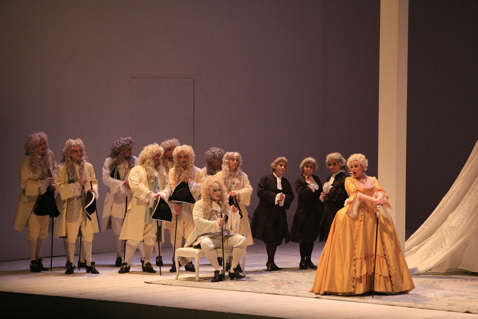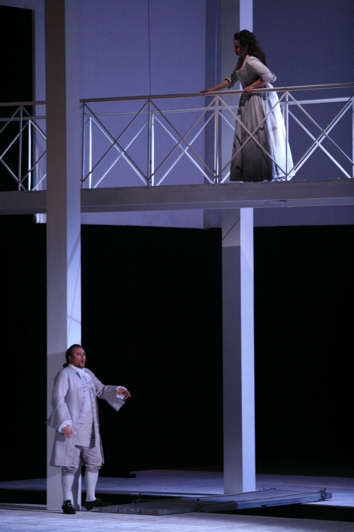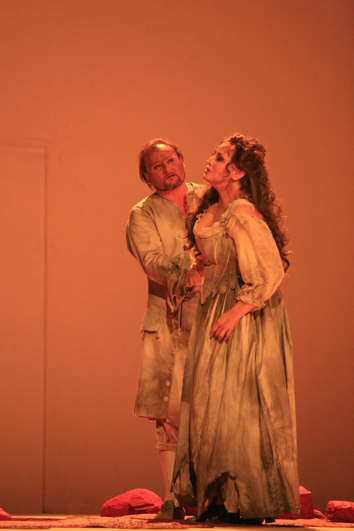Other Links
Editorial Board
- Editor - Bill Kenny
- London Editor-Melanie Eskenazi
- Founder - Len Mullenger
Google Site Search
Puccini, Manon Lescaut:
production from Deutsche Oper Berlin. Soloists, chorus and
orchestra of Teatro Carlo Felice, Daniel Oren conductor. Genoa,
Italy. 17.1.2008 (MM)
Giacomo Puccini's Manon Lescaut at the Teatro Carlo Felice
(17/1/2008) started out with a bang - as the evening's conductor
made his way to the pit's podium he was instantaneously recognized
as Daniel Oren, not the young conductor announced in the program.
As Mr. Oren turned from a very brief, cursory acknowledgement of
his applause he was already raising his arms to attack Puccini's
fragile masterpiece.
Director Deflo is obviously a theater director with actors at his
disposal whose movements and physical attitudes can fill such a
neutral space. In the expanses of the Carlo Felice stage the
conception was most effective when character singers were at work,
as for example the rich Geronte, and his household staff in Act
II, these caricatured abstractions working well with the
exaggerated emotions. Or the actresses as the exaggerated
prostitutes in Act III effectively separating Manon in her
degradation from their flashy pride. Here too Deflo's minimalism
was effective in the use one small scenic element, a small boat,
to send Manon and Des Grieux off to America. The principal
singers whose movements and physical attitudes are specific to the
needs and habits of opera singers were less effective, looking as
if they had been thrown into a warmed-over production, which of
course it was.

ACT II
Attack it he certainly did, dispelling the myth that this work is
fragile, needing delicate balances of interpreters, music and
production to take on an ephemeral life. Oren's Manon Lescaut
is a masterpiece of verismo at its finest and melodramma
at its purest. The first of Puccini's mature works (only Edgar
and Le Villi come before) Manon Lescaut (1893)
betrays the French origins of verismo in distilling the
abbé Prévost's Manon story into four emotionally charged scenes.
Massanet had already told Prévost's histoire much more
realistically and delicately, but some ten years earlier.
And forget about Manon and her brother's high-born origins, both
embody the baser instincts verismo likes to find among the
lower classes; look only to Henze's wonderfully sleazy Manon in
Boulevard Solitude to complete this picture.
But do think melodramma, the super Italian soupy film genre
(like Catene (1949), a film that made Sicilian audiences
weep in Cinema Paradiso) where the woman succumbs to
understandable temptation, only to regret her fall before being
forgiven, though too late.
While Oren is not Puccini, he is Puccini's music pure and simple,
sometimes remaining immobile, then stomping then jumping on the
podium, emitting grunts and snorts, usually singing along while
expansively pulling his orchestra together to emote in one huge
voice along with his inspired singers: then he applauds his
singers
appreciatively right along with the enthused
audience. Mr. Oren is a phenomenon.

ACT III
In the absence of a production specifically developed for such a
musically brutal conception of Puccini's opera, the Teatro Carlo
Felice imported Flemish director Gilbert Deflo's production from
the Deutsche Oper Berlin. At first his white box concept (actors
in high relief in relatively neutral surroundings with few props)
evoked a déjà vu disappointment, but as the musical force
of the production took over, the white box setting began essentially
to service the telling of the story without either
effectively absorbing it or detracting from it.

ACT IV
The Manon of Micaela Carosi rose magnificently to the occasion,
her rich, warm, spinto voice offering Oren everything needed to
encourage her to bring out the subtleties of pathos of this
difficult role. Renzo Zulian, singing two of the seven
performances, delivered a Des Grieux with little finesse but with
ample vocalism to serve musical needs. Manon' brother Lescaut,
sung by Gabriele Viviani, proved less of a vivid vocal presence
while the Geronte of Carlo Lepore was classy singing in ridiculous
clothing.
Pictures © Teatro Carlo Felice
Back
to Top
Cumulative Index Page
